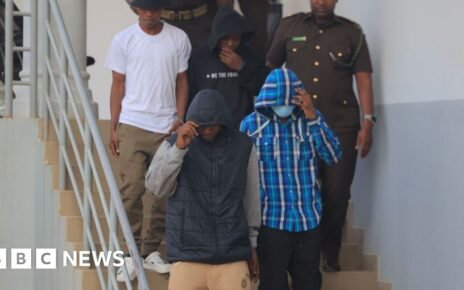[ad_1]
Questions have swirled about how police officers and agents tasked with securing Donald Trump’s rally allowed the gunman to get as close as he did.
Thomas Matthew Crooks was able to access the roof of a building near the outdoor event at Butler County fairgrounds, Pennsylvania, from where he shot at Trump 130m (430ft) away.
The US Secret Service has since said that they had assigned local police to provide cover for that building.
One crowd member was killed and two others were critically injured. Trump was wounded in the ear.
Secret Service spokesman Anthony Guglielmi said that his agency had relied on local police to help.
He said his agents were responsible for securing inside the perimeter of the fairgrounds, while local police secured the area outside, which included the private building used by the gunman.
The local sheriff’s department referred BBC questions to the state police, which said it was not responsible for the area containing the building.
A spokesman told the BBC that it provided “all resources” requested by the Secret Service, including between 30 and 40 troopers inside perimeter.
Many observers have questioned how security plans broke down to allow the gunman unobstructed access to Trump.
Crowd members said they had spotted the suspect on the roof minutes before the shooting started, while Butler County Sheriff Michael Slupe said a local security officer had also spotted him but could not stop him.
The sheriff admitted there had been “a failure” in securing the premises, but said he believed that there was no single party to blame.
It is common for the US Secret Service to rely on local police for help when securing rallies, said Jason Russell, founder of Secure Environments Consultants who worked as an agent from 2002 to 2010, including during election campaigns.
“The Secret Service doesn’t have unlimited resources in terms of agents that they can post everywhere,” he told the BBC.
He said that agents usually scope out a campaign event’s venue days in advance to develop a security plan that is then shared with local police agencies.
In this case, he said the building the gunman was on would have been outside of the event’s official grounds, and the responsibility of local police.
During an event, he said communications were shared with every agency involved. However, he added that in “the 10 seconds that it takes” for information to flow through, that could be just enough time for a gunman to fire a few shots.
The rooftop was a known vulnerability before the event, according to NBC News, which cited two sources familiar with Secret Service operations.
Mr Russell said it was probable that Secret Service agents identified that building as a threat ahead, and had requested local authorities to station officers nearby to prevent access.
“For whatever reason, that didn’t happen,” he said.
One witness, Thomas Gleason, who served 21 years with the US Army as paratrooper and ranger, said “there should have been greater security for a long-range threat”.
“Looking at the distance and vantage point, if someone is going to try to assassinate [Trump] that would have been the most logical shooting point,” he said.
The FBI has since taken over the role of lead investigator into the incident, and the shooting is now the subject of several other investigations by both the House and the Senate.
Secretary of Homeland Security Alejandro Mayorkas called it a “failure” of security, telling CNN that “an incident like this cannot happen again”.
The director of the US Secret Service Kimberly Cheatle said on Monday that her agency is working with federal and local police to “understand what happened, how it happened, and how we can prevent an incident like this from taking place again”.
She added that she will cooperate with any congressional investigations into the shooting.
Ms Cheatle will face the House Committee on Oversight and Accountability on 22 July. Republicans on the committee have also called on the Secret Service to produce evidence including internal communications, audio and video recordings, messages to local law enforcement, maps, diagrams and pre-event assessments.
[ad_2]
Source link



